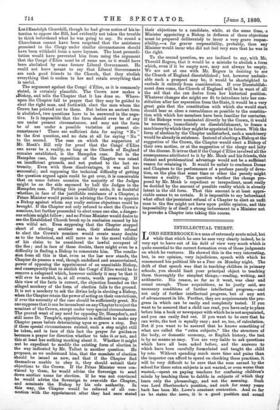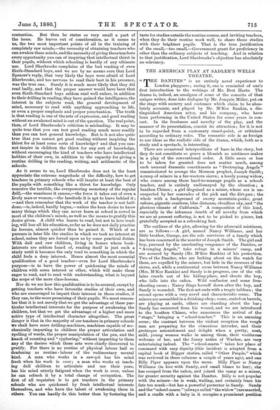INTELLECTUAL THIRST. L ORD SlIERBROOKE is a man of extremely acute
mind, but while that which he sees he sees very clearly indeed, he is very apt to leave out of his field of view very much which is quite essential to the correct formation even of those judgments on which he ventures. He showed this in the very interesting, but, in our opinion, very injudicious, speech with which he commenced his political life as a Peer on Monday night. The drift of that speech was that in teaching children in primary schools, you should limit your principal object to teaching them thoroughly the simplest things,—reading, writing, and arithmetic. His reason, so far as it went, was clear and sound enough. These acquisitions, as he justly said, are necessary conditions of further intellectual progress,—and not only of further intellectual progress, but of any sort of advancement in life. Further, they are acquirements the pro- gress in which can be easily and completely tested. If you want to be assured that a child can read, you have only to place before him a book or newspaper with which he is not acquainted, and you can easily find out. If you want to be sure that he can write, the test is equally easy ; and so, too, of calculation. But if you want to be assured that he knows something of what are called the "extra subjects," like the structure of the body, or domestic economy, or English history, the test is by no means so easy. You are very liable to ask questions which have all been asked before, and the answers to which have been carefully formulated and taught the child by rote. Without spending much more time and pains than the inspector can afford to spend on checking these practices, it will be very difficult to be sure that the sum earned by the school for these extra subjects is not wasted, or even worse than wasted,—spent on paying teachers for confusing children's minds by teaching them to dabble in subjects of which they learn only the phraseology, and not the meaning. Such was Lord Sherbrooke's position, and such for many years back has been Mr. Lowe's constant contention And so far as he states the issue, it is a good position and sound contention. But then he Mates so very small a part of the issue. He leaves out of consideration, as it seems to us, the two most important points of all in the training of completely raw minds,—the necessity of obtaining teachers who can awaken these minds, and the necessity of giving these teachers every opportunity you can of inspiring that intellectual thirst in their pupils, without which schooling is hardly of any ultimate use. Lord Sherbrooke complains of the bad reading of even SiTth-Standard boys, and we are by no means sure that Lord Spencer's reply, that very likely the boys were afraid of Lord Sherbrooke, and too nervous to read their best in his presence, was the true one. Surely it is much more likely that they did read badly, and that the proper answer would have been that even Sixth-Standard boys seldom read well unless, in addition to their drilling in reading, they have gained the intelligence, the interest in the subjects read, the general development of mind, necessary to read with anything approaching to life, or even a proper emphasis and proper punctuation. The truth is that reading is one of the arts of expression, and good reading without an awakened mind is out of the question. The real point, then, of Lord Sherbrooke's criticism is misleading. It may be quite true that you can test good reading much more readily than you can test general knowledge. But is it not also quite true that you cannot get good reading without inspiring the thirst for at least some sorts of knowledge? and that you can- not inspire in children the thirst for any sort of knowledge, without encouraging the kind of teachers who have intellectual hobbies of their own, in addition to the capacity for giving a routine drilling in the reading, writing, and arithmetic of the schools.
As it seems to us, Lord Sherbrooke does not in the least appreciate the extreme magnitude of the difficulty, how to get teachers in primary schools who will inspire at least the best of the pupils with something like a thirst for knowledge. Only conceive the terrible, the overpowering monotony of the regular drill,—the weariness it causes,—the force it takes out of even a lively man or woman,—the lassitude it is apt to leave behind it ; —and then remember that the work of the teacher is not half- done,—is, indeed, hardly begun,—unless the keen desire to know many things which they can never learn at school is sowed in most of the children's minds, as well as the means to gratify this desire given. A child who learns to read, but not to love read- ing, will lose all his education, so far as he does not daily practise its lessons, almost quicker than he gained it. Which of us pursues in later life the studies in which we took no interest at school, unless they are forced upon us by some practical duties. With dull and raw children, living in homes where book- interests are seldom heard of, reading itself is just such a study until it becomes the only road to something in which the child feels a deep interest. Hence almost the most essential qualification of a good teacher—even for Lord Sherbrooke's purpose—is to have the power of quickening the minds of children with some interest or other, which will make them eager to read, and to read with understanding, what is beyond the scope of the mere class-lessons.
Nor do we Bee how this qualification is to be secured, except by getting teachers who have favourite studies of their own, and who are encouraged to impart their interest in those studies, if they can, to the more promising of their pupils. We must remem- ber that it is not merely that we get the advantage of these par- ticular intellectual interests for the purpose of awakening the children, but that we get the advantage of a higher and more active type of intellectual character altogether. The great danger is that in the majority of our teachers in primary schools we shall have mere drilling-machines, machines capable of me- chanically imparting to children the proper articulation and spelling of words, the proper manipulation of the pen, and the knack of counting and "cyphering," without imparting to them any of the desires which these arts were chiefly discovered to gratify. For there is no routine of physical labour half so deadening as routine - labour of the rudimentary mental kind. A man who works in a saw-pit has his mind fresh when his work is over; a man who works at teach- ing dull children to articulate and use their pens, has his mind utterly fatigued when the work is over, unless he can refresh it by a total change of occupation. The first of all requisites is to get teachers in the primary schools who are quickened by fresh intellectual interests themselves, and who have the talent of awakening these in others. You can hardly do this better than by fostering the
taste for studies outside the routine course, and inviting teachers, when they do their routine work well, to share those studies with their brightest pupils. That is the true justification of the small,—too small,—Government grant for proficiency in other than the ordinary subjects of teaching. And in relation to that justification, Lord Sherbrooke's objection has absolutely no relevancy.



































 Previous page
Previous page